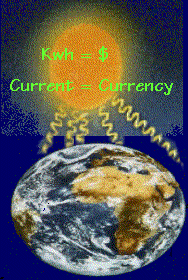A Contribution to General Systems Theory (GST)
Version 1.16 by Kirby Urner
Table of Contents
- Asset: Our Sponsoring Sun
- Liability: Our Broken Economy
- Net Worth: The Role of Intelligence
- The Alchemy of Language
- The Meaning of Intelligence
- Real Security: a Curriculum Concern
- GST: Ending the Economists' Monopoly
- GST Graphics with Explanatory Text
 Asset:
Our Sponsoring Sun
Asset:
Our Sponsoring Sun
Entering line items onto the planetary balance sheet of energy Assets & Liabilities, we place Sun, an atomic-powered fusion furnace, in the assets column.
Earth Incorporated is a nonprofit corporation, if conceived in bookkeeping terms, because she is a sponsored enterprise fueled by grant income from Sun. Terawatts of full spectrum, sky-filtered, radiation bathe our land- and sea-scapes -- not a loan, but a grant, continuously given.
Whatever circuitry we humans co-invent with nature within and around our biosphere, does not for a moment reverse the cosmic flow. Earth receives a steady current, like a home appliance plugged into a grid, and current equals currency: money from heaven pure and simple. We cannot repay Sun.
Sun is not a bank, and yet is at the top of the wealth pyramid, empowering all below. At some level further down the pyramid, we humans contrived banking and invented interest, but not on the model of our whole system enterprise, the Earthian economy.
Pyramidal power structures intervene between sunlight and those who would consume it, to create areas of light and shadow. This we call our economy, although it is seamlessly embedded within our ecology from which it ultimately cannot be differentiated.
Liability: Our Broken Economy
In the shadowy realms of our economy, the energy-starved turn to skeletons and die for lack of calories and care. We contrive mountains of excuses for our neglect, but the bottom line is, if our criteria are to remain humane, we must judge our economy as broken, fallen, sinful, in error, a failure, all of the above. Until recently, we had not the tools to provide for all; but today we do. The price of technological advance is the crossing of evolutionary thresholds, and the ignition of new tests, new imperatives. To continue "business as usual" (rampant neglect) is to artificially dumb ourselves down. And so we list this broken economy in the Liabilities column, recognizing that it contains the seeds of transformation, the potential for advance to the next level.
Assets - Liabilities = Net Worth. Where do we come out in the eyes of would-be investors. What investors? Suppose you knew for a fact that you would reincarnate again and again, for many generations, as many believe you will. Would you feel more like a long term investor then? Surely a rising Net Worth would portend a greater statistical likelihood of prosperity and happiness in your next life. How would you strive to improve our global economy, given your understanding of cause and effect?
Net Worth: The Role of Intelligence
This is an open ended question designed to invoke a thoughtful response, which is to elicit another item for the Assets column: intelligence. Sun + intelligence must contend with a broken economy. An objective measure of our intelligence is, in fact, a diminishment of pain and suffering on our planet. Intelligence must flow through our broken circuits, our madly missfiring neural nets, in order to heal an injured humanity. This challenge, to transform our broken economy into a working one, is a call to the alchemists, for such is their vocation: saving the world.
Saving the world is a deadly serious business and every generation has committed to it. The world is in perpetual need of saving, and at no point in time becomes "saved" -- the job is never ending. Every action, every inaction, joins the incalculably complicated web of events, perhaps advancing our economy, perhaps making others work harder to advance it. Am I part of the problem, or part of the solution, right now. And how about right now? -- more open ended, intelligence-eliciting questioning.
